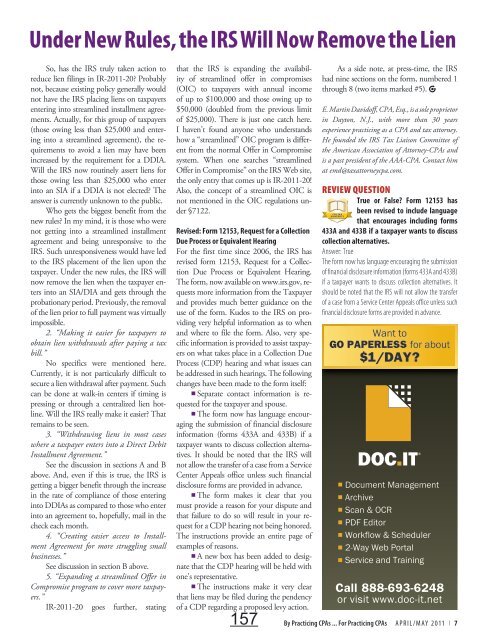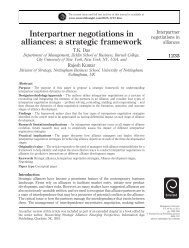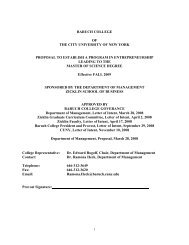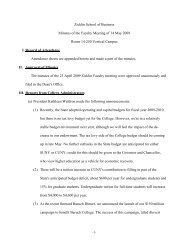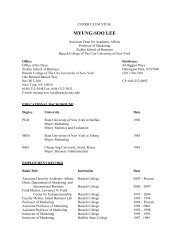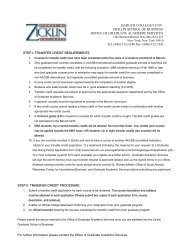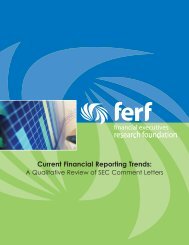Tax Seminar #3 – December 3 2012
Workbook - Zicklin School of Business
Workbook - Zicklin School of Business
Create successful ePaper yourself
Turn your PDF publications into a flip-book with our unique Google optimized e-Paper software.
Under New Rules, the IRS Will Now Remove the Lien<br />
So, has the IRS truly taken action to<br />
reduce lien filings in IR-2011-20? Probably<br />
not, because existing policy generally would<br />
not have the IRS placing liens on taxpayers<br />
entering into streamlined installment agreements.<br />
Actually, for this group of taxpayers<br />
(those owing less than $25,000 and entering<br />
into a streamlined agreement), the requirements<br />
to avoid a lien may have been<br />
increased by the requirement for a DDIA.<br />
Will the IRS now routinely assert liens for<br />
those owing less than $25,000 who enter<br />
into an SIA if a DDIA is not elected? The<br />
answer is currently unknown to the public.<br />
Who gets the biggest benefit from the<br />
new rules? In my mind, it is those who were<br />
not getting into a streamlined installment<br />
agreement and being unresponsive to the<br />
IRS. Such unresponsiveness would have led<br />
to the IRS placement of the lien upon the<br />
taxpayer. Under the new rules, the IRS will<br />
now remove the lien when the taxpayer enters<br />
into an SIA/DIA and gets through the<br />
probationary period. Previously, the removal<br />
of the lien prior to full payment was virtually<br />
impossible.<br />
2. “Making it easier for taxpayers to<br />
obtain lien withdrawals after paying a tax<br />
bill.”<br />
No specifics were mentioned here.<br />
Currently, it is not particularly difficult to<br />
secure a lien withdrawal after payment. Such<br />
can be done at walk-in centers if timing is<br />
pressing or through a centralized lien hotline.<br />
Will the IRS really make it easier? That<br />
remains to be seen.<br />
3. “Withdrawing liens in most cases<br />
where a taxpayer enters into a Direct Debit<br />
Installment Agreement.”<br />
See the discussion in sections A and B<br />
above. And, even if this is true, the IRS is<br />
getting a bigger benefit through the increase<br />
in the rate of compliance of those entering<br />
into DDIAs as compared to those who enter<br />
into an agreement to, hopefully, mail in the<br />
check each month.<br />
4. “Creating easier access to Installment<br />
Agreement for more struggling small<br />
businesses.”<br />
See discussion in section B above.<br />
5. “Expanding a streamlined Offer in<br />
Compromise program to cover more taxpayers.”<br />
IR-2011-20 goes further, stating<br />
that the IRS is expanding the availability<br />
of streamlined offer in compromises<br />
(OIC) to taxpayers with annual income<br />
of up to $100,000 and those owing up to<br />
$50,000 (doubled from the previous limit<br />
of $25,000). There is just one catch here.<br />
I haven’t found anyone who understands<br />
how a “streamlined” OIC program is different<br />
from the normal Offer in Compromise<br />
system. When one searches “streamlined<br />
Offer in Compromise” on the IRS Web site,<br />
the only entry that comes up is IR-2011-20!<br />
Also, the concept of a streamlined OIC is<br />
not mentioned in the OIC regulations under<br />
§7122.<br />
Revised: Form 12153, Request for a Collection<br />
Due Process or Equivalent Hearing<br />
For the first time since 2006, the IRS has<br />
revised form 12153, Request for a Collection<br />
Due Process or Equivalent Hearing.<br />
The form, now available on www.irs.gov, requests<br />
more information from the <strong>Tax</strong>payer<br />
and provides much better guidance on the<br />
use of the form. Kudos to the IRS on providing<br />
very helpful information as to when<br />
and where to file the form. Also, very specific<br />
information is provided to assist taxpayers<br />
on what takes place in a Collection Due<br />
Process (CDP) hearing and what issues can<br />
be addressed in such hearings. The following<br />
changes have been made to the form itself:<br />
n Separate contact information is requested<br />
for the taxpayer and spouse.<br />
n The form now has language encouraging<br />
the submission of financial disclosure<br />
information (forms 433A and 433B) if a<br />
taxpayer wants to discuss collection alternatives.<br />
It should be noted that the IRS will<br />
not allow the transfer of a case from a Service<br />
Center Appeals office unless such financial<br />
disclosure forms are provided in advance.<br />
n The form makes it clear that you<br />
must provide a reason for your dispute and<br />
that failure to do so will result in your request<br />
for a CDP hearing not being honored.<br />
The instructions provide an entire page of<br />
examples of reasons.<br />
n A new box has been added to designate<br />
that the CDP hearing will be held with<br />
one’s representative.<br />
n The instructions make it very clear<br />
that liens may be filed during the pendency<br />
of a CDP regarding a proposed levy action.<br />
157<br />
As a side note, at press-time, the IRS<br />
had nine sections on the form, numbered 1<br />
through 8 (two items marked #5).<br />
E. Martin Davidoff, CPA, Esq., is a sole proprietor<br />
in Dayton, N.J., with more than 30 years<br />
experience practicing as a CPA and tax attorney.<br />
He founded the IRS <strong>Tax</strong> Liaison Committee of<br />
the American Association of Attorney-CPAs and<br />
is a past president of the AAA-CPA. Contact him<br />
at emd@taxattorneycpa.com.<br />
REVIEW QUESTION<br />
True or False? Form 12153 has<br />
CPA TAX<br />
UNIVERSITY<br />
been revised to include language<br />
that encourages including forms<br />
433A and 433B if a taxpayer wants to discuss<br />
collection alternatives.<br />
Answer: True<br />
The form now has language encouraging the submission<br />
of financial disclosure information (forms 433A and 433B)<br />
if a taxpayer wants to discuss collection alternatives. It<br />
should be noted that the IRS will not allow the transfer<br />
of a case from a Service Center Appeals office unless such<br />
financial disclosure forms are provided in advance.<br />
By Practicing CPAs ... For Practicing CPAs APRIL/MAY 2011 I 7


